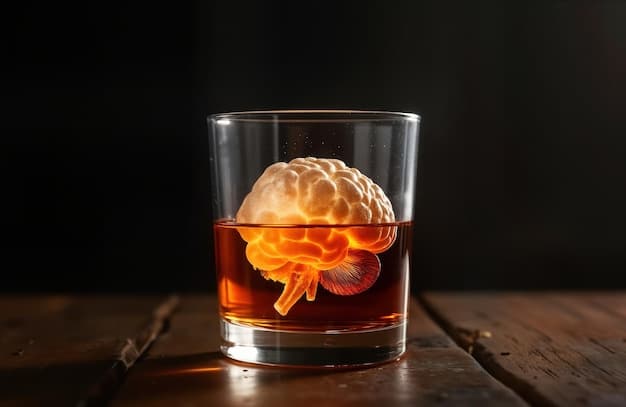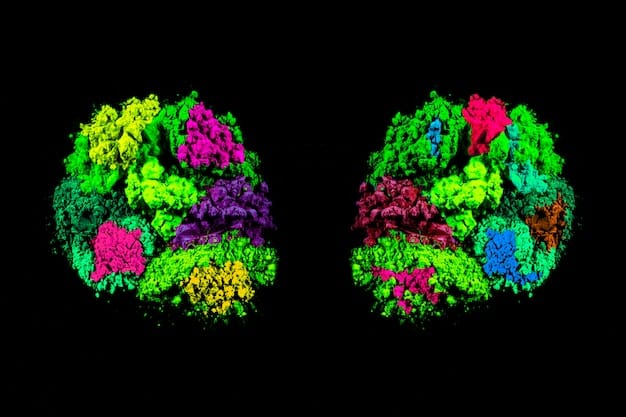Understanding the Long-Term Cognitive Effects of Alcohol Abuse: A 2025 Update

The long-term cognitive effects of alcohol abuse can include impaired memory, reduced executive function, and increased risk of dementia, impacting an individual’s ability to learn, problem-solve, and maintain overall brain health.
The repercussions of chronic alcohol abuse extend far beyond immediate health concerns, significantly impacting cognitive functions. Understanding the long-term cognitive effects of alcohol abuse is crucial for individuals and their families in 2025.
Exploring the Damaging Impact of Alcohol on Cognitive Functions
Alcohol, while seemingly harmless in moderation, can wreak havoc on the brain when consumed excessively over long periods. This section delves into the comprehensive damage it inflicts on various cognitive functions.
We’ll examine how sustained alcohol abuse leads to specific cognitive impairments, impacting daily life and overall well-being.
Memory Impairment
One of the most prevalent cognitive consequences of chronic alcohol abuse is memory impairment. Alcohol interferes with the brain’s ability to form new memories and retrieve old ones.
This leads to difficulties in learning new information and recalling past events. The damage can vary from mild forgetfulness to severe amnesia, significantly disrupting daily life.
Executive Function Deficits
Executive functions, which control planning, decision-making, and problem-solving, are also vulnerable to the toxic effects of alcohol. Chronic abuse can impair these abilities, leading to impulsive behavior, poor judgment, and difficulty in organizing tasks.
Individuals may struggle with managing time, prioritizing activities, and adapting to changing situations.
.
- Reduced Attention Span: Difficulty focusing and maintaining concentration.
- Impaired Planning: Struggling to organize tasks and set goals.
- Decision-Making Problems: Making impulsive and often poor choices.

In conclusion, the damaging impact of alcohol on cognitive functions is a serious concern. Memory impairment and executive function deficits are just some of the challenges faced by those struggling with chronic alcohol abuse, underscoring the need for awareness, prevention, and effective treatment strategies.
The Link Between Alcohol Abuse and Increased Dementia Risk
The risk of developing dementia later in life is significantly higher for individuals with a history of chronic alcohol abuse. This section explores the connection between alcohol abuse and the increased likelihood of developing dementia.
Understanding this relationship is critical for advocating for early intervention and preventative strategies.
Alcohol-Related Brain Damage
Chronic alcohol abuse leads to structural and functional changes in the brain, known as alcohol-related brain damage. This damage can manifest as reduced brain volume, white matter abnormalities, and disruptions in neural pathways, accelerating cognitive decline.
This cumulative damage increases the susceptibility to dementia and other neurodegenerative diseases.
Wernicke-Korsakoff Syndrome
Wernicke-Korsakoff syndrome is a specific type of alcohol-related dementia caused by a deficiency in thiamine (vitamin B1). The syndrome manifests with severe memory loss, confusion, and impaired coordination.
Early diagnosis and treatment with thiamine supplementation can help manage the symptoms, but the damage is often irreversible.
- Increased Amyloid Plaques: Higher levels of amyloid plaques, a hallmark of Alzheimer’s disease, often found in alcohol abusers.
- Vascular Damage: Damage to blood vessels in the brain, contributing to vascular dementia.
- Inflammation: Chronic inflammation caused by alcohol abuse accelerates neurodegeneration.
Ultimately, the link between alcohol abuse and increased dementia risk is undeniable, emphasizing the importance of moderation, early intervention, and preventive measures.
Specific Cognitive Deficits Associated with Alcohol Abuse
Chronic alcohol abuse is correlated with a range of specific cognitive deficits that significantly impact an individual’s daily functioning. In this section, we’ll identify these deficits and their implications.
By understanding these specific cognitive deficits, we can develop more targeted interventions and support strategies.
Visual-Spatial Skills Impairment
Alcohol abuse can impair visual-spatial skills, leading to difficulty in navigating environments, recognizing objects, and performing tasks that require spatial awareness. This impairment affects simple tasks such as reading a map or parking a car.
Also, it could hinder more complex activities such as playing sports or assembling furniture.
Language Difficulties
Chronic alcohol abuse affects language processing, leading to difficulties in understanding and producing speech. This can manifest as problems with word retrieval, sentence construction, and comprehension of complex language.
These language difficulties can strain communication abilities and interpersonal relationships.
- Impaired Reaction Time: Slower reaction times make tasks requiring quick decision-making more challenging.
- Reduced Problem-Solving Abilities: Difficulty in analyzing situations and finding effective solutions.
- Decreased Cognitive Flexibility: Inability to adapt to new information or change strategies when needed.

In conclusion, specific cognitive deficits associated with alcohol abuse have far-reaching consequences. From visual-spatial skills impairment to language difficulties and impaired reaction time, each deficit impairs daily functioning and quality of life, underlining the need for comprehensive approaches to prevention and treatment.
Reversing Cognitive Damage: Potential for Recovery in 2025
While the long-term cognitive effects of alcohol abuse can be severe, there is potential for recovery with the right interventions. This section discusses the possibilities for reversing cognitive damage.
We will explore the role of abstinence, rehabilitation, and other supportive therapies in promoting cognitive recovery.
The Role of Abstinence
Abstinence from alcohol is the first and most critical step in cognitive recovery. When alcohol is no longer present, the brain has a chance to repair itself. Studies have shown that abstinence supports neuroplasticity.
This is the brain’s ability to reorganize itself by forming new neural connections. This neuroplasticity leads to remarkable improvement in cognitive function over time.
Rehabilitation and Cognitive Training
Rehabilitation programs, including cognitive training, play a vital role in helping individuals regain lost cognitive skills. Cognitive training involves targeted exercises and activities designed to improve memory, attention, and executive function.
These programs work to strengthen neural pathways and enhance cognitive reserve, maximizing the potential for recovery.
- Nutritional Support: Providing essential nutrients, especially thiamine, supports brain health and function.
- Medication: Certain medications may help manage specific cognitive symptoms and support recovery.
- Psychotherapy: Therapy addresses underlying issues contributing to alcohol abuse and supports overall well-being.
In conclusion, reversing cognitive damage from alcohol abuse is feasible through a combination of abstinence, rehabilitation, cognitive training activities, nutritional support, targeted medication, and psychotherapy. With comprehensive and sustained intervention, individuals can regain function and improve overall well-being.
Preventive Strategies to Minimize Long-Term Cognitive Risks
Preventing alcohol abuse is key to minimizing long-term cognitive risks. This section explores effective preventive strategies to protect cognitive health and reduce the likelihood of alcohol-related damage.
By implementing these strategies, individuals and communities can promote healthy lifestyles and mitigate the harmful effects of alcohol.
Education and Awareness Programs
Education and awareness programs increase understanding regarding the risks associated with alcohol abuse. These programs target various age groups, from adolescents to adults, disseminating knowledge about the cognitive and physical consequences of excessive alcohol consumption.
Educating the public empowers individuals to make informed choices and seek help when needed.
Early Intervention Strategies
Early intervention strategies are crucial for identifying and addressing alcohol abuse problems before they escalate. These strategies involve screening for alcohol misuse, providing brief interventions, and referring individuals to treatment services.
By intervening early, it is possible to prevent the progression of alcohol abuse and minimize the risk of long-term cognitive damage.
- Responsible Drinking Guidelines: Adhering to responsible drinking guidelines reduces the risk of alcohol-related harm.
- Support Networks: Having strong support networks promotes healthy coping mechanisms and reduces the likelihood of alcohol abuse.
- Policy Measures: Implementing policies that regulate the availability and marketing of alcohol can help reduce consumption and prevent abuse.
Ultimately, preventive strategies are vital in minimizing long-term cognitive risks associated with alcohol abuse. Through education, early interventions, responsible drinking habits, strong social support, and effective public policies, we can promote healthy lifestyles to protect the individuals and communities now and for the future.
Future Research Directions in Understanding Alcohol’s Cognitive Impact
As we move into 2025, it is essential to highlight future research directions in understanding alcohol’s cognitive impact and also uncover new avenues for prevention and treatment. This section outlines promising areas for further investigation.
By investing in research, we can enhance our understanding of how alcohol affects the brain and improve outcomes for individuals struggling with alcohol abuse.
Neuroimaging Studies
Neuroimaging studies such as MRI and PET scans provide valuable insights into the structural and functional changes in the brain of chronic alcohol abusers. Future research focuses on using advanced imaging techniques to identify early markers of cognitive decline and monitor the effects of interventions.
These studies will help refine diagnostic criteria and enhance the development of targeted treatments.
Longitudinal Studies
Longitudinal studies that track individuals over extended periods are critical for assessing the long-term cognitive consequences of alcohol abuse and identifying protective factors that promote resilience. These studies allow the evolution of cognitive deficits over time.
They will help clarify the trajectory of alcohol-related cognitive damage and inform preventive strategies.
- Genetic Factors: Investigating genetic factors that predispose individuals to alcohol abuse and cognitive impairment.
- Biomarkers: Identifying biomarkers that can predict the development of alcohol-related cognitive damage.
- Novel Therapies: Exploring the potential of novel therapies, such as transcranial magnetic stimulation (TMS) and pharmacological interventions, in promoting cognitive recovery.
In conclusion, future research is essential for advancing our understanding of alcohol’s cognitive impact and improving outcomes for individuals affected by alcohol abuse. Through neuroimaging studies, longitudinal research, investigation of genetic markers, examination of novel biomarkers, and treatment options, we can pave the way for more effective prevention and care strategies in the years to come.
| Key Point | Brief Description |
|---|---|
| 🧠 Cognitive Impairment | Chronic alcohol abuse can disrupt memory, executive functions, and learning. |
| ⚠️ Dementia Risk | Alcohol abuse increases the risk of developing dementia and related conditions. |
| 🌱 Recovery Potential | Abstinence, rehabilitation, and cognitive training may enable recovery of some cognitive functions. |
| 🛡️ Prevention | Education, early intervention, and supportive policies are crucial for preventing alcohol-related cognitive damage. |
Frequently Asked Questions
▼
Alcohol abuse primarily affects memory, executive functions (planning, decision-making), visual-spatial skills, and language processing. These impairments reduce an individual’s daily life and overall functionality.
▼
While severe damage can be irreversible, many individuals experience cognitive improvements with abstinence and rehabilitation. Earlier intervention helps increase the likelihood of meaningful recovery.
▼
Early signs include increased forgetfulness, difficulty concentrating, mood changes, and impaired coordination. Observing these signs should prompt an evaluation by healthcare professionals.
▼
Cognitive training programs help enhance memory, attention, and executive functions. These improve focus which significantly supports overall cognitive recovery post-alcohol abuse.
▼
Adhering to responsible drinking guidelines, maintaining a healthy diet, engaging in regular exercise, and seeking social support are lifestyle choices that can mitigate alcohol harm.
Conclusion
Understanding the long-term cognitive effects of alcohol abuse is essential for prevention and intervention. By addressing the cognitive impairments, dementia risks, and potential recovery strategies, individuals and communities can make informed decisions and strive for healthier, more fulfilling lives.





